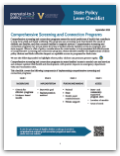Early Head Start (EHS) is a program serving low-income pregnant women, infants, toddlers, and their families by providing child development and family support services in various child care settings.
Rigorous evidence indicates high-quality EHS services and supports bolster children’s wellbeing and development directly and indirectly, by providing children with individualized services, high-quality early care and learning environments, and by building parents’ skills and community connections.
This checklist covers the following policy levers states may consider to expand access to Early Head Start:
- State funding
- Early Head Start-child care partnerships
- Supplemental state programs




